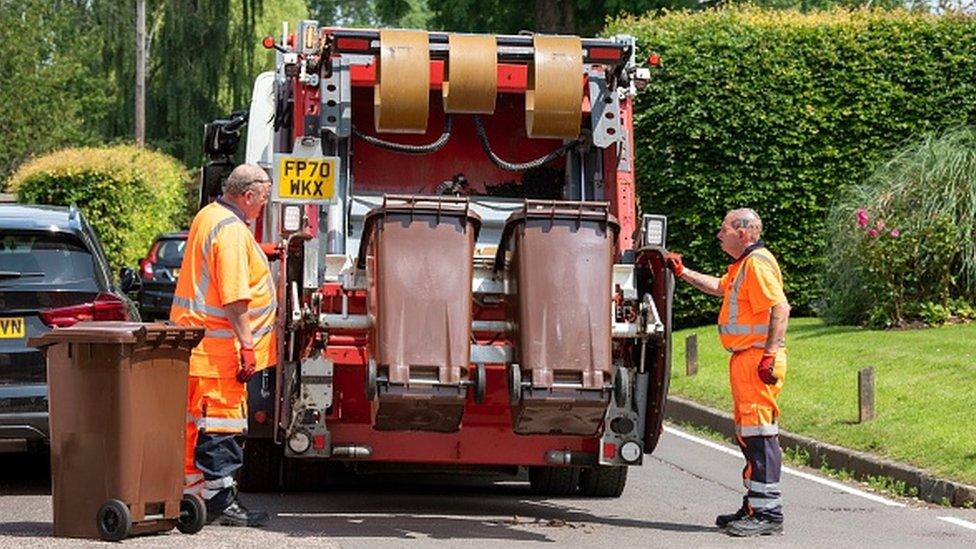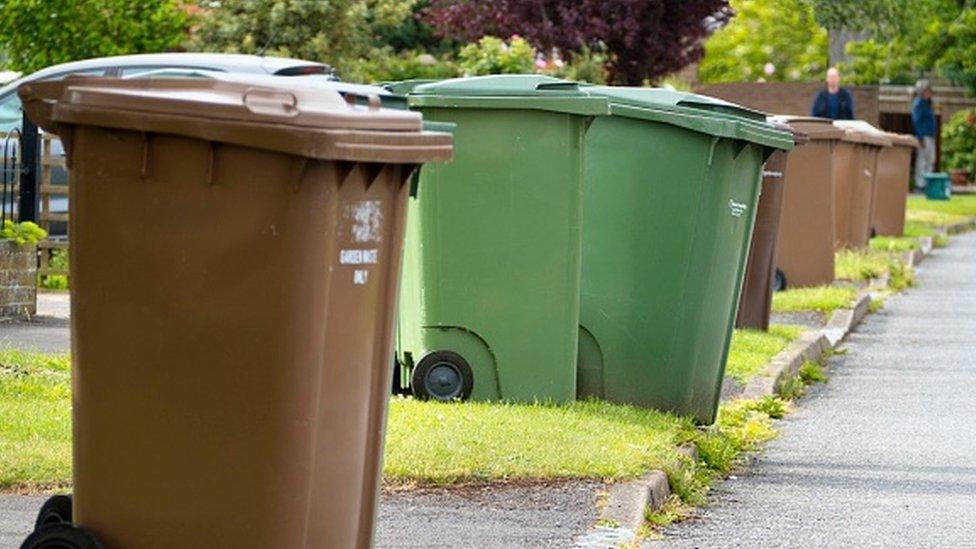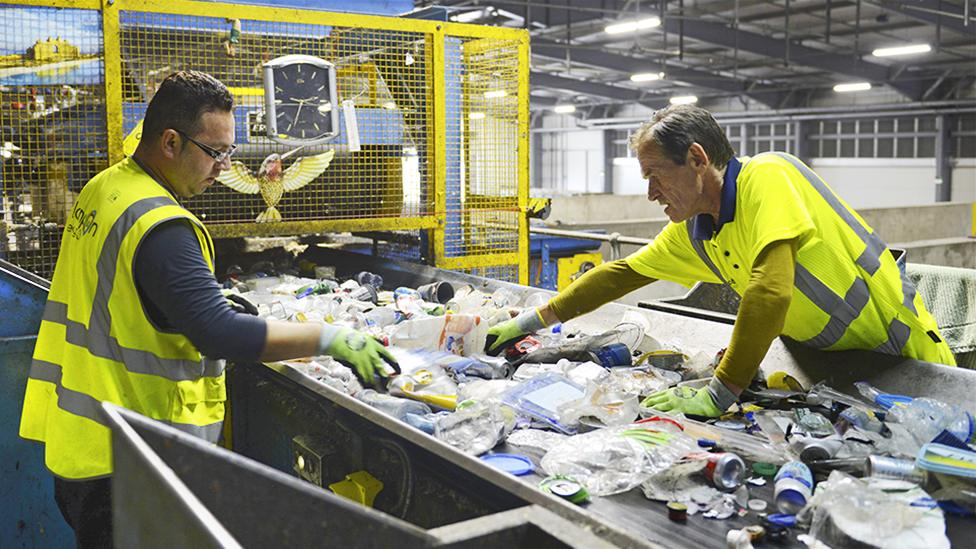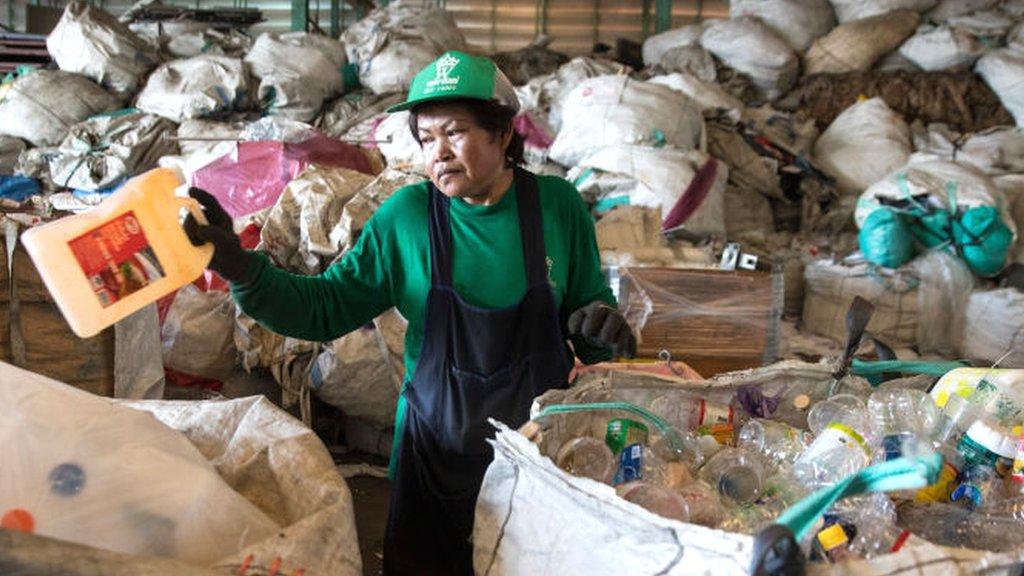Bin collection: Council anger over delay until after next election
- Published

The government's reforms on waste collection have been delayed multiple times
Council leaders have accused the government of delaying controversial plans to make households in England use up to six different recycling bins until after the next general election.
The government says the move was postponed until 2025 as part of broader changes to recycling policy.
But councils claim the real reason is that Prime Minister Rishi Sunak wants to avoid it becoming an election issue.
They have warned the bin changes could prove costly and unworkable.
The move to as many as six separate recycling bins had already been delayed multiple times.
Sam Corcoran, the Labour leader of Cheshire East Council, branded Mr Sunak's administration a "lame-duck government who won't make any difficult decisions".
"If the government can't make decisions, they just need to call a general election. They're just delaying anything that's going to be controversial."
Richard Wright, the Conservative leader of North Kesteven District Council, said putting off these changes until 2025 was "not good enough".
He said apart from reducing costs for businesses, "I can't see what advantage there is to kicking this into the long grass".
"It certainly doesn't give local authorities more time to prepare, because we can't prepare unless we know what we're preparing for," he said.
"It's the uncertainty. It leaves us in limbo."
The next general election must be called by December 2024 at the latest, though it is widely expected to be held in the autumn.
Cost of living
The government said the changes to bin collections in England had been shelved until an extended producer responsibility (EPR) scheme was in place.
The scheme forcing large retailers and food producers to cover the cost of collecting and recycling packaging they imported or supplied was due to start next year, and would have helped councils pay for the new bin collections. The EPR scheme was deferred by a year.
The industry had been pressing for a delay to the scheme after warning its estimated £1.7bn-a-year cost to businesses would be passed on to shoppers.
Following meetings with the industry, the government announced, external the scheme would be deferred from October 2024 to 2025, until after the next general election.
The decision, the government said, would relieve cost-of-living concerns and give local authorities more time to prepare for the scheme.
A government source said the EPR scheme and the recycling collection reforms were "intimately linked with one another" and had to be delivered together.
Ahead of May's local elections, the BBC was told the details of the waste overhaul had almost been finalised.
The latest delay has added to the sense of discontent felt by council leaders, who have been waiting for years for the introduction of new rules on waste collection.
Waiting continues
The government has been working out how these waste reforms would work in practice since the Environment Act became law in 2021.
The act requires the collection of six recyclable waste "streams" from households, including plastics, metal, glass, paper and card, food waste and garden waste.
Councils will have to collect waste from these six streams separately, unless it is not technically or economically practicable, or there is no significant environmental benefit in doing so.
Under the plans, councils would also need to collect food waste weekly, as well as offer a basic free service to remove garden waste.
The new policies would not apply in Scotland, Wales and Northern Ireland, where devolved administrations decide how to manage their waste.
The government has set a target for 65% of domestic waste in England to be recycled by 2035.
Despite their opposition, local authorities had been poised to implement the reforms, said Sarah Nelmes, environment spokesperson for the District Councils' Network.
She said the delays were slowing down vital investment in recycling infrastructure and "stifling councils improving their services".
Ms Nelmes said the government knew the changes would prompt "some fallout from a lot of authorities of every colour".
Charlotte Paine, who leads the Conservative-run South Holland District Council's operational services, said she was disappointed by the delay but was trying to find the positives in the situation.
"It does bring about the opportunity to utilise this time to ensure that these significant changes can be brought about in a clear, deliberate and deliverable way," she said.
But she said the delay means key decisions on the decarbonisation of vehicles and investment in infrastructure have been put off.
"In local government, there will remain an unease to move forward on the proposals of consistency in collections without this confidence and clarity on funding, for risk of spending public money on policies that may never see the light of delivery," she added.
Watch: How much plastic recycling is actually recycled?
Related topics
- Published4 April 2023

- Published20 March 2023

- Published25 October 2021
